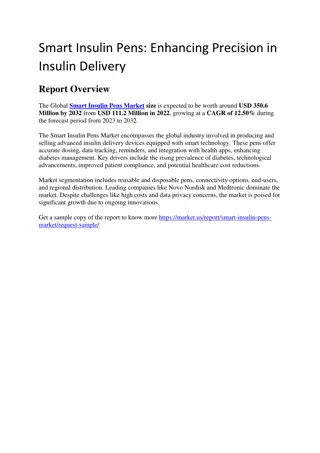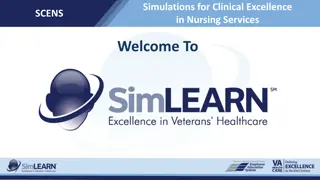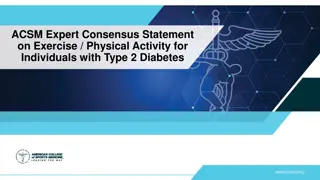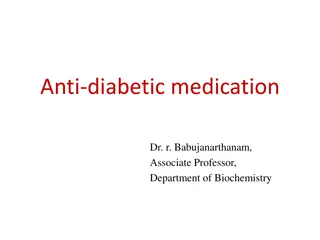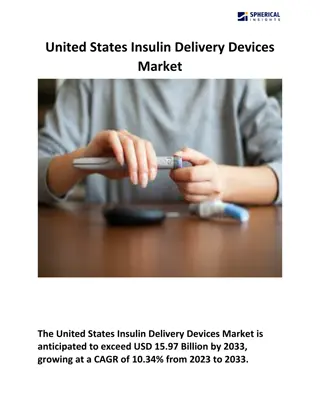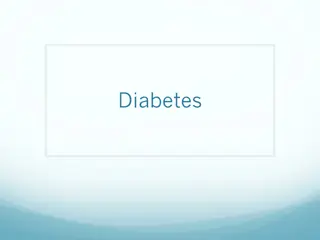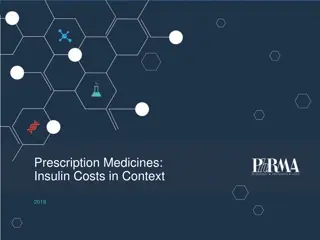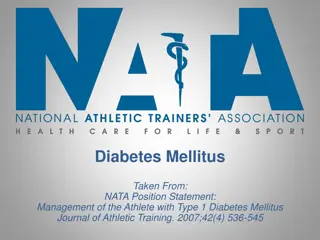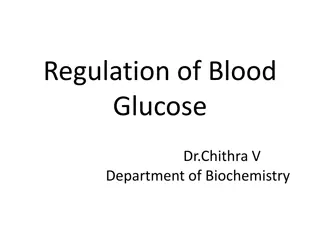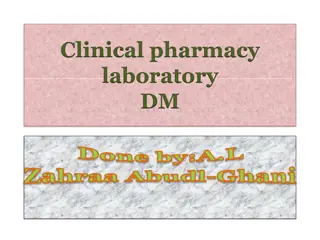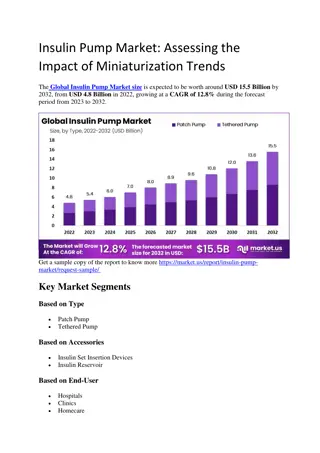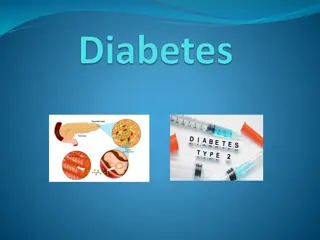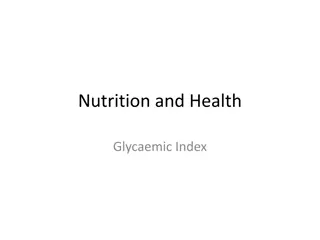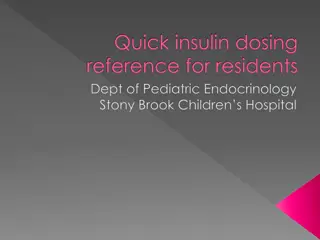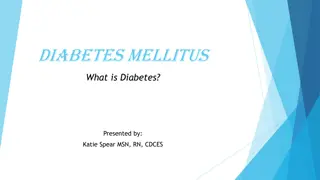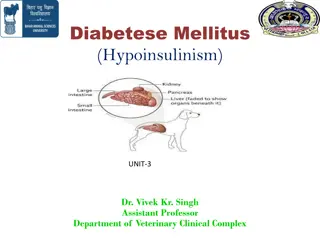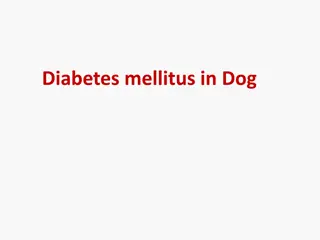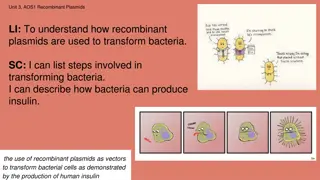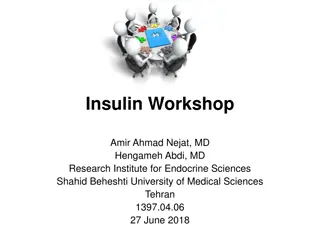Understanding Gestational Diabetes: Risk Factors, Diagnosis, and Management
Gestational diabetes is a condition where high blood sugar levels develop during pregnancy in women without pre-existing diabetes. Risk factors include maternal age, family history of diabetes, ethnicity, and obesity. Diagnostic tests involve measuring blood glucose levels, and management includes a
1 views • 15 slides
Understanding Insulin Pump Therapy and Continuous Glucose Monitoring
Exploring the basics of insulin pump therapy, including the basal/bolus concept, operation of insulin pumps, advantages and limitations, day-to-day living with a pump, continuous glucose monitoring, and available systems.
1 views • 45 slides
Understanding Wolfram Syndrome: Symptoms and Implications
Wolfram Syndrome, also known as DIDMOAD, is a rare genetic disorder affecting about 1 in 160,000-770,000 people worldwide. It is characterized by the presence of Diabetes Insipidus, Diabetes Mellitus, Optic Atrophy, and Deafness. The primary genetic mutation in the WFS1 gene leads to various symptom
0 views • 22 slides
Theresa S. Clark - Diabetes Educator Program Coordinator
Theresa S. Clark, MS, RD, LD, CDE, BC-ADM, is a dedicated Diabetes Educator and Program Coordinator at the Diabetes Resource Center in Hopkinsville, KY. She specializes in insulin therapies and teaches patients about insulin administration, carbohydrate counting, and mealtime insulin dosing. Certifi
1 views • 50 slides
The Impact of Smart Insulin Pens on Diabetes Care: Market Perspectives
The Global\u00a0Smart Insulin Pens Market size\u00a0is expected to be worth around\u00a0USD 350.6 Million by 2032\u00a0from\u00a0USD 111.2 Million in 2022, growing at a\u00a0CAGR of 12.50%\u00a0during the forecast period from 2023 to 2032.
0 views • 5 slides
Simulation-Based Training for Diabetes Care in Nursing
This simulation program, SCENS, focuses on enhancing nursing skills in managing diabetes-related complications such as hyper/hypoglycemia. The learning objectives include assessment, safe care provision, insulin administration, and effective communication. The simulation addresses the significant im
0 views • 17 slides
Expert Consensus Statement on Exercise for Type 2 Diabetes
This expert consensus statement provides an update on exercise recommendations for individuals with type 2 diabetes (T2D), emphasizing the benefits of physical activity in improving glycemic management, insulin sensitivity, cardiovascular health, and overall disease risk reduction. The document high
0 views • 16 slides
Senior Wellness Presentation: Managing Diabetes Through Exercise
Explore the benefits of exercise in managing diabetes for seniors, including tips on starting an exercise routine and preventing health issues associated with diabetes. Discover how exercise can improve insulin sensitivity and overall well-being for individuals with Type 2 Diabetes. The presentation
0 views • 14 slides
Overview of Anti-Diabetic Medication and Treatment Options
Anti-diabetic medications are used to treat diabetes by lowering glucose levels in the blood. There are various classes of drugs such as insulin, sensitizers, secretagogues, and more, each targeting different aspects of diabetes management. Type 1 diabetes requires insulin injections, while Type 2 d
0 views • 5 slides
United States Insulin Delivery Devices Market
\"The United States Insulin Delivery Devices Market is anticipated to exceed USD 15.97 Billion by 2033, growing at a CAGR of 10.34% from 2023 to 2033.\n\"\n
0 views • 4 slides
Understanding Diabetes: Types, Causes, and Prevention
Diabetes is a disease that affects how the body uses glucose, the main source of fuel. There are two main types of diabetes – Type 1 and Type 2. In Type 1 diabetes, the pancreas fails to produce insulin, while in Type 2, the body's cells do not respond properly to insulin. Uncontrolled diabetes ca
1 views • 14 slides
Human Insulin Gene Expression and Production
The process of cloning and expressing the human insulin gene has revolutionized the production of insulin for treating diabetes. By using genetically engineered bacteria, the human insulin gene is inserted, expressed, and purified to create insulin for therapeutic use. This innovation has overcome c
0 views • 20 slides
Insights into Insulin Costs and Diabetes Management in 2019
Medical innovation has revolutionized diabetes treatment, providing advanced insulin options for better blood sugar control and reducing complications. Improved medication adherence among diabetes patients can lead to significant cost savings and enhance health outcomes. Despite declining prices for
0 views • 10 slides
Diabetes Mellitus Type 1 Management Guidelines for Athletes
Diabetes Mellitus Type 1 is a chronic endocrine disorder characterized by hyperglycemia, absolute insulin deficiency, and autoimmune origins. This condition, more common among athletes, requires careful monitoring, insulin therapy, blood glucose management during exercise, and recognition of hypogly
0 views • 7 slides
Applications of Recombinant DNA Technology in Biotechnology
Explore the various applications of recombinant DNA technology in biotechnology, including insulin production for diabetes, enzyme production in food biotechnology, and the development of Golden Rice. Understand the process of insulin production using recombinant DNA technology and the significance
0 views • 32 slides
Understanding Type 1 Diabetes Pathophysiology and Etiology
Type 1 diabetes is characterized by absolute insulin deficiency, resulting from pancreatic beta cell destruction. It is prone to ketosis with a total deficit of circulating insulin, often due to autoimmune factors. The pathophysiology involves inflammation, immune-mediated cell destruction, and a ch
0 views • 13 slides
Regulation of Blood Glucose and Its Importance in Maintaining Health
Blood glucose regulation is crucial for energy supply in the body, particularly for brain function. Understanding the balance of glucose entering and leaving the blood through processes like absorption, glycogenolysis, and gluconeogenesis is vital. Hormones like insulin and glucagon play key roles i
0 views • 10 slides
Clinical Pharmacy Laboratory DM and Insulin Dosing Regimens
This comprehensive content covers various insulin dosing regimens used in clinical pharmacy laboratories for patients with diabetes mellitus. It includes examples of dosing regimens before meals and at bedtime, methods of insulin administration, vial images, mixing of different types of insulin, and
0 views • 14 slides
Insulin Pump Market
The\u00a0Global Insulin Pump Market size\u00a0is expected to be worth around\u00a0USD 15.5 Billion\u00a0by 2032, from\u00a0USD 4.8 Billion\u00a0in 2022, growing at a\u00a0CAGR of 12.8%\u00a0during the forecast period from 2023 to 2032.
0 views • 4 slides
Insulin Pens Market
The Insulin Pens Market is set to reach $6.73 bn by 2031, growing at 6.7% CAGR. Explore types, diabetes types, distribution channels, and healthcare settings.
0 views • 9 slides
The Insulin Pens Market is set to reach $6.73 bn by 2031
The Insulin Pens Market is set to reach $6.73 bn by 2031, growing at 6.7% CAGR. Explore types, diabetes types, distribution channels, and healthcare settings.
2 views • 9 slides
Smart Insulin Pens Market Set for Significant Expansion Amid Increasing Demand f
Smart Insulin Pens Market projected to reach $776.5 Mn by 2031, growing at a CAGR of 11.2% from 2024. Explore trends, drivers, and key players in the industry.\n
2 views • 9 slides
Understanding Diabetes Mellitus and Dental Plaque
Diabetes mellitus is an endocrine disorder characterized by high blood glucose levels due to insufficient insulin production or ineffectiveness. Type 1 diabetes is insulin-dependent and typically develops in childhood, while Type 2 diabetes is non-insulin dependent and often seen in overweight adult
0 views • 13 slides
Virtual Annual Diabetes Management Training Video in Oklahoma
This content showcases training materials related to diabetes management provided by the Oklahoma State Department of Education. It includes images, enrollment information, and quiz details. Learners are guided through sections and quizzes on topics like insulin and diabetes. The virtual training ai
0 views • 16 slides
Understanding and Managing Hyperglycemic Crises: DKA and HHS
Hyperglycemic crises such as Diabetic Ketoacidosis (DKA) and Hyperglycemic Hyperosmolar State (HHS) are life-threatening emergencies characterized by severe hyperglycemia and metabolic imbalances. DKA involves absolute or near-absolute insulin deficiency leading to ketone body production and systemi
0 views • 82 slides
Understanding Glycaemic Index in Nutrition and Health
Glycaemic Index (GI) measures how carbohydrate-containing foods affect blood glucose levels. High GI foods raise blood glucose rapidly, while low GI foods release glucose gradually. Studies track impacts on blood glucose levels, insulin secretion, fat storage, and pancreatic function. High GI foods
0 views • 15 slides
New Recommendations for Insulin Injection Technique and Needle Length - Guided by Expert Advice
The new recommendations emphasize using a 4mm needle for insulin injections to reduce the risk of incorrect administration. This needle length is suitable for children, adolescents, thin adults, and even obese patients. The guidelines also highlight the importance of perpendicular insertion of the n
0 views • 53 slides
Investigating Regulation of Aging by Transcription Factors DAF-16 and SKN-1 in the IIS Pathway in C. elegans
Aging regulation in eukaryotic organisms, particularly in Caenorhabditis elegans, is studied through the Insulin/Insulin-like Growth Factor-1 Signaling pathway. This research focuses on understanding how transcription factors DAF-16 and SKN-1 may act together to promote longevity by reducing the IIS
0 views • 11 slides
Pediatric Endocrinology Insulin Dosing Guide
Comprehensive reference for insulin dosing in pediatric endocrinology, covering onset, peak, and duration of action of various insulin preparations, guidelines for twice-daily dosing, managing Dawn Phenomenon and rebound hyperglycemia, and tips for multiple daily injections. Includes information on
0 views • 13 slides
Comprehensive Overview of Rush Copley Outpatient Diabetes Center
The Rush Copley Outpatient Diabetes Center, led by Donna Carter RN, CDE, offers a rich history of diabetes treatment, from ancient practices to modern advancements. With a focus on patient education and management, the center serves various diabetes types and provides specialized care, including ins
0 views • 18 slides
Understanding Type 1 Diabetes: Causes, Symptoms, and Treatment
Type 1 diabetes is a condition where the pancreas fails to produce insulin, leading to high blood sugar levels. Without insulin, the body cannot use sugar for energy, resulting in various symptoms like hunger and fat burning. This article provides an overview of diabetes, how insulin works, and the
0 views • 13 slides
Understanding Diabetes Mellitus: Causes, Effects, and Management
Diabetes Mellitus is a condition characterized by high blood sugar levels due to insufficient insulin production or utilization. It affects various organs and requires careful management through lifestyle changes, medication, or insulin therapy. While the exact causes are still being researched, fac
0 views • 18 slides
Understanding Diabetes Mellitus in Dogs: Causes, Symptoms, and Treatment
Diabetes mellitus is a common endocrine disorder in dogs, characterized by symptoms like polyuria, polyphagia, and cataract development. The etiology involves insulin deficiency and insulin resistance, leading to hyperglycemia and various clinical manifestations. Diagnosis is based on symptoms, glyc
0 views • 9 slides
Stroke Hyperglycemia Insulin Network Effort (SHINE) Trial - Case #1 Control Group Protocol
The SHINE trial involves treatment protocols for hyperglycemia in stroke patients. In case #1, a patient is enrolled in the control group with specific timing requirements for checks, dosing, and insulin administration. Understanding the hourly and Q3 hourly check schedules is crucial for proper pat
0 views • 26 slides
Understanding Canine Diabetes Mellitus: Causes, Symptoms, and Treatment
Canine diabetes mellitus is a common disease in dogs, primarily affecting middle-aged and older dogs. Unlike Type 2 diabetes in humans, dogs mainly experience insulin-dependent Type 1 diabetes. The condition results from beta cell dysfunction in the pancreas, leading to insulin deficiency. Causes in
0 views • 32 slides
Understanding Recombinant Plasmids in Bacterial Transformation
Recombinant plasmids play a crucial role in transforming bacteria for producing proteins like insulin. The process involves steps such as uptake through methods like heat shock or electroporation, culturing with antibiotics, and selection of transformed cells. By introducing human genes into bacteri
0 views • 15 slides
Revolutionizing Diabetes Care with Innovative Insulin Pump Solutions
Diabetes is a serious health condition affecting millions worldwide. This project aims to address the growing prevalence of diabetes by introducing advanced insulin pump technology. With a focus on the US market and a comprehensive strategy, including market information, components of insulin pumps,
0 views • 14 slides
Insulin Pens Market Expected to Surpass $6.73 Billion by 2031 Amid Growing Healt
Explore $6.73 billion Insulin Pens Market: Get exclusive insights on key market trends, segments, geographical analysis, & competitive analysis
1 views • 9 slides
Clinical Cases of Diabetes Management: Insights and Recommendations
Explore three detailed cases of patients with type 2 diabetes mellitus, their current treatment regimens, complications, and potential adjustments to improve glycemic control. Recommendations for treatment modifications, including insulin initiation, titration options, and lifestyle changes. Enhance
0 views • 23 slides
Anesthesia Preparation and Airway Assessment for Knee Arthroscopy Patient
An overview of preparing a diabetic patient for knee arthroscopy surgery, including considerations for anesthesia, diabetes management, and airway assessment. The patient in this case study has a torn meniscus and is categorized as ASA Class 2. Steps to ensure optimal diabetes control, preoperative
0 views • 19 slides




